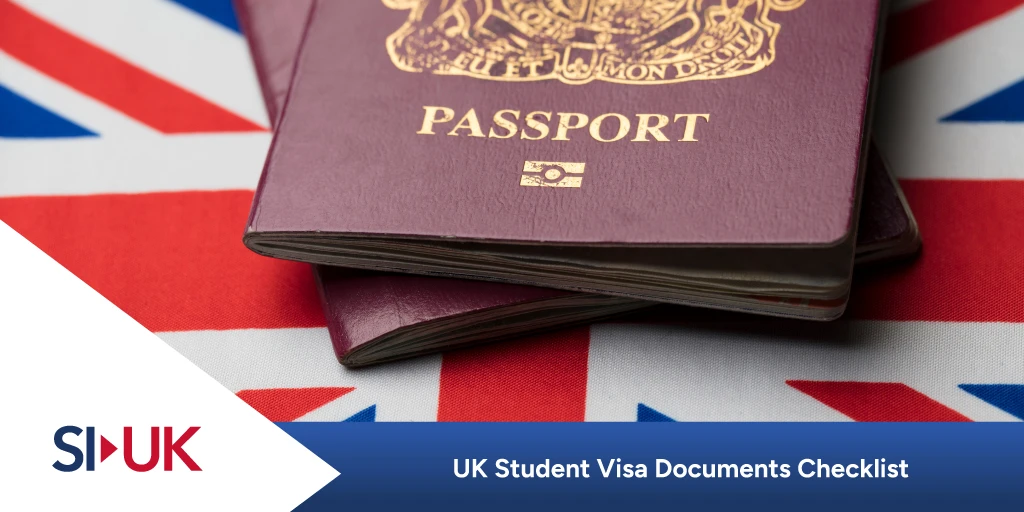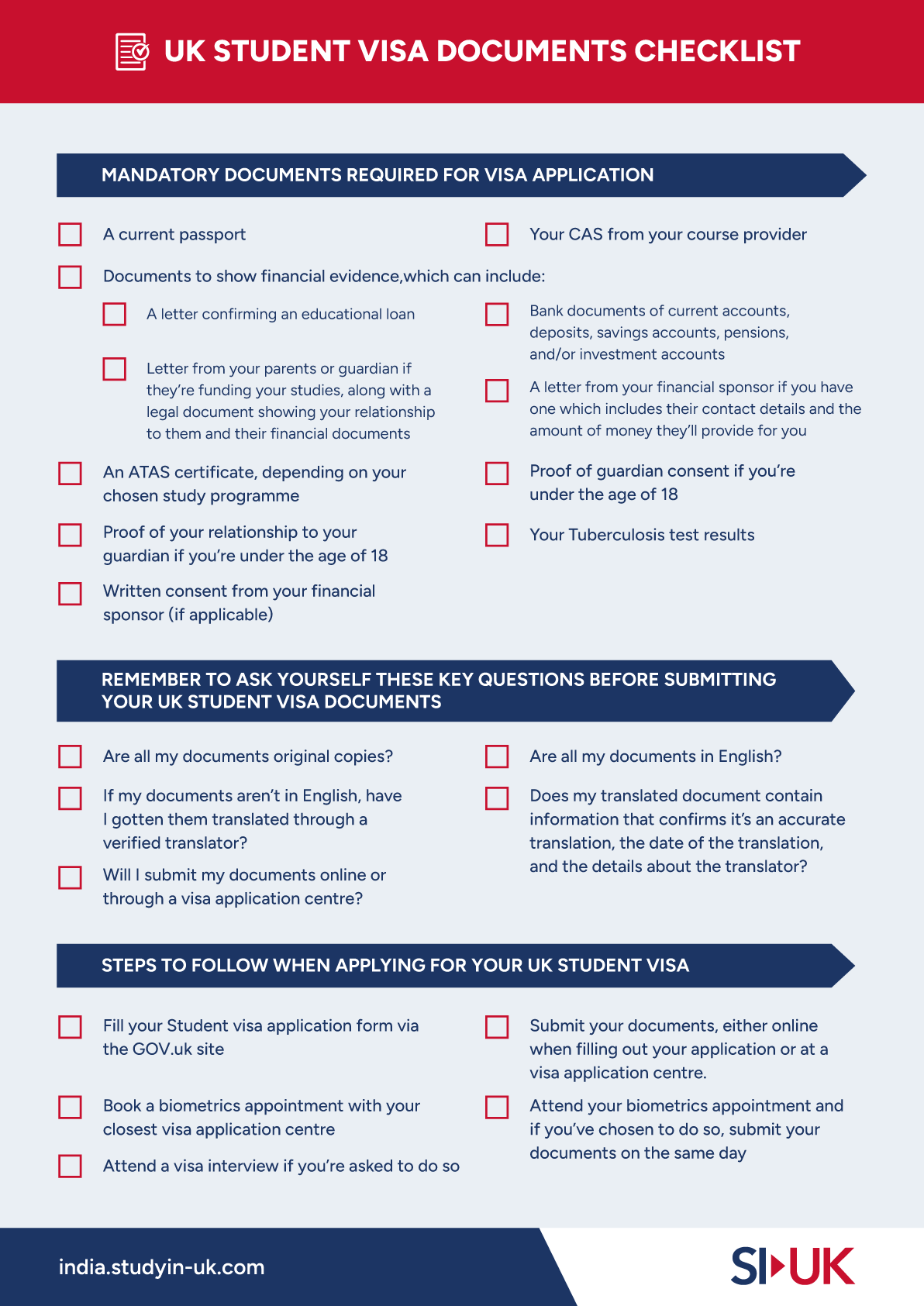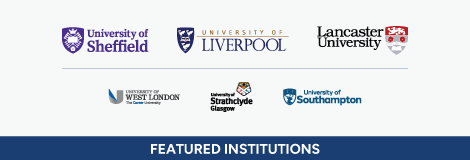The UK's rich culture and diverse academic and professional pathways make it an attractive study option for many international students, but getting accepted to a UK university is only the first step towards accessing these opportunities. The next is to obtain the right to study visa in the UK – this is dependent on you submitting the correct supporting documents with your application.
In this blog, we’ll be covering three key stages of your visa application, including:
- Documents to obtain a UK Student visa
- Documents to take with you for your visa interview
- Documents to switch to a Graduate visa once you’re done with your degree.
To start the process of applying for your student visa, you’ll need to fill in your Student visa application form online which can be found through the GOV.UK site. It will cost you £490 and you’ll also have to pay the healthcare surcharge as part of your application – usually £1,552 for a two-year visa, though the exact amount depends on the length of your visa.
You can either submit your documents by yourself when you’re filling in your online application or pay for a value added service to submit your documents at a visa application centre when you go to give your biometrics (we’ve covered this process down below). Before we start looking at the documents you need, let’s start by understanding the requirements you need to keep in mind.

Eligibility requirements to obtain a Student visa for UK
Before you start your visa application, you need to determine whether you’re eligible for a UK Student visa. To be eligible for one, you must have:
- A Confirmation of Acceptance for Studies (CAS) from a valid UK institution
- English proficiency scores
- Documents that prove you have enough finances for your study and stay in the UK
While the above eligibility requirements are mainly for a UK Student visa, there are a few other types of study visas too. Before you come to the UK, check the type of visa you need for your degree program – most undergraduate or postgraduate courses require a Student visa, but some courses to study English only or shorter programmes may require a different type of visa. We’ll be taking a closer look at the differences and details in the table below.
Types of study visa for UK
Here’s an overview of the types of study visas to the UK.
| Visa name | Who can apply? | When to apply? | Arrival in the UK |
|---|---|---|---|
| General Student visa | If you’re over 16 years old and have an offer to study at a licensed UK institution, have enough money for your expenses in the UK, and have the required English capabilities, you can apply for a Student visa. | If you’re outside the UK, you can apply six months before the start of your course. If you’re applying for a Student visa from inside the UK, you can apply three months before you start your course. |
You can arrive in the UK on or after the start date given on your visa (usually one month before your course start date for one that lasts more than six months). |
| Child Student visa | If you’re between four and 17 years old, have an unconditional offer from a licensed independent school, have enough funds for your expenses, and have the consent of your parent/guardian to study in the UK, you can apply for this type of visa. | If you’re outside the UK, you can apply six months before the start of your course. If you’re applying for a Student visa from inside the UK, you can apply three months before you start your course. |
You can arrive in the UK on or after the start date given on your visa. |
| Short-term study visa (Study English in the UK) | If you’ve been accepted to an English language course that will last between six and 11 months in an accredited institution, are over 16 years old, and have enough funds for your expenses and travel back from the UK, you can apply for this visa. | You can apply three months before the start of your course. | You can arrive in the UK on or after the start date given on your visa. |
Once you’ve determined whether you meet the eligibility requirements for a UK Student visa, the next step is to get your documents in order. We’ve outlined this process next.
Documents you’ll need to apply for your UK Student visa
The documents that you need to provide with your application will depend on a variety of factors, including your circumstances, your programme, and the university you want to join. While some documents are marked as mandatory for all applicants, there are some you may have to provide specific to your situation.
In summary, the documents you need are:
- A current passport
- Your CAS
- Documents of financial evidence
- ATAS certificate (if required)
- Proof of guardian consent (if applicable)
- Proof of your relationship to your guardian (if applicable)
- Your TB certificate
- Written consent from your financial sponsor (if applicable)
- Documents about your dependants (if applicable)
All the documents you submit for your UK Student visa application must be original copies (not scanned or photocopied), and if a document isn’t in English, then a translated copy that is certified must be provided.
Any translated copy must include the following information:
- Confirmation that it is an accurate translation (This is usually done by getting your translated copy verified as a ‘true copy’ by a lawyer.)
- Date of translation
- Full name and signature of the translator
- Contact details of the translator
The most important part to remember is to submit all the documents that are required for your application as not doing so could result in a visa refusal. We’ve covered all the documents in detail next, and there’s a handy UK Student visa documents checklist as well that you can download to help you out.
A current passport
Your passport is a mandatory requirement, and is used to prove your identity and nationality. Remember to ensure that you’re not submitting an expired passport by checking whether it’s current and valid well in advance.
A CAS from your course provider
The other mandatory document is your CAS – you’ll receive this from your course provider, confirming your acceptance into their programme. Your CAS is used to determine if you meet the requirements for a UK Student visa, your work rights, and whether you can take your dependents with you to the UK.
Your CAS is virtually assigned to you by the institution you plan to study in, along with an official offer for placement in a course. Each CAS has a unique reference number that which links it to information about your:
- Personal details
- Sponsor
- Course of study
- Finances
- Academic and English language abilities
Your CAS is one of the most important documents you’ll submit with your application, as it allows a visa officer access to these details about yourself which influences their decision about your visa.
Documents to show financial evidence for your UK Student visa
Understanding the upfront payment you need to show at your time of application for a Student visa and which financial documents are valid can seem overwhelming at first, but this process becomes easy when you first determine two key aspects of your stay in the UK: your course length and place of stay.
The proof of funding you need to show at the time of your application depends on the duration of your course and where in the UK you plan on staying. As a general rule, you must demonstrate you have sufficient funds to pay outstanding course fees for your first academic year and for your living expenses for nine months.
Each student’s financial circumstances are different – you may be a self-sponsored student, you may be getting help from your parents to study in the UK, or you may be partly or fully sponsored by an official sponsor (such as a scholarship). We’ve listed out the documents that which are valid for each scenario here.
1. If you’re a self-sponsored student, you can submit the following documents:
- If you have an educational loan, a letter confirming it
- Bank documents showing funds from either your current accounts, deposits, savings accounts, pensions, and/or investment accounts
- Documents showing that your funds can be accessed immediately
2. If you’re being funded by your parents or guardian, you can submit these documents:
- A letter from your parent or guardian confirming their relationship to you and their permission for you to use their funds towards your studies
- A legal document confirming your relationship to them – this could be a birth certificate or court document confirming guardianship
- Their financial documents, such as bank statements
3. If you’re a scholarship or sponsored student, you must submit a letter from your sponsor confirming the details of their scholarship/sponsorship for you. For the UK Student visa, official sponsor letters are only accepted from:
- The UK Government or your country’s government
- The British Council
- An international organisation or company with an office in more than one country
- A university
When providing evidence of funds, remember that the following methods aren’t accepted as valid by the UK’s Home Office:
- Overdrafts
- Cryptocurrency
- Stocks and shares
- Pensions
- Bank accounts that are not regulated by your country’s financial regulator
- Bank accounts that don’t use electronic record-keeping
A large part of making sure you submit the correct financial documents is about getting organised but if you’re unsure about how to get started, reach out to our visa team who are specialists in assisting students with their UK Student visa.
A valid ATAS certificate if required
The Academic Technology Approval Scheme (ATAS) certificate is only applicable to postgraduate students who are planning to study or research subjects related in the development of:
- Advanced Conventional Military Technology (ACMT)
- Weapons of Mass Destruction (WMD)
- Technology that may aid in the delivery of the above
You’ll need to keep at least 30 days to receive your ATAS certificate after you’ve applied for it, so remember to account for this time before you start your visa application.
Proof of guardian consent if you’re under the age of 18
If you’re under 18 at the date of your application, you must show you have the consent of your parents or guardian to live and study in the UK. Written consent must come from either of your parents, one parent if they have the sole responsibility for you, or your legal guardian. The written consent must include their contact details and confirm their support for your application, your living and care arrangements in the UK, and your travel and reception arrangements in the UK.
Proof of your relationship to your guardian if you’re under 18 years
Along with a signed letter from your parents or guardian, you also need to submit evidence proving your relationship to them. This can include a birth certificate, an adoption certificate, or a court document.
Your tuberculosis (TB) test results
If you’ve lived in India for six months before your arrival date to the UK and you’re going to the UK for more than six months, you’ll need to take a TB test as part of your visa application. Your TB test will include a chest X-ray, and if you don’t have TB, you’ll be given a certificate that is valid for six months.
Written consent from your financial sponsor (if applicable)
We’ve already covered this under the section on financial documents, but here are some additional details to help you out. If you’re being sponsored by an official sponsor, their letter of confirmation must show:
- The date
- Name of the financial sponsor
- Contact details of the financial sponsor
- The amount of money they’ll provide for you
Documents about your dependants
Depending on the type of programme you want to pursue, your dependents (such as your partner and any children) may be able to join you in the UK. If you are planning for this, you’ll need to provide evidence of your relationship with them when you apply. An easy way to do this is by submitting marriage and birth certificates, for example. You’ll also have to show you have additional funding to support your dependents as well.
It’s important to ensure that you don’t miss out on submitting even one document as this could significantly delay the approval of your visa, so keep our UK Student visa documents checklist in hand when organising your documents. We’ve linked a downloadable version below.
How we can help you get started on your UK Student visa application
Since your documents account for an important aspect of your visa application, remember to prepare well in advance. Find your original copies and ensure they’re clear and valid, get them translated to English if needed by a valid translator, ensure your passport is in order, and contact your financial sponsor for their letter.
Download our UK Student visa documents checklist to help you organise your documents.

If you’re still unsure of how to get started with your visa application, contact us as our visa team specialises in a number of visa related services. Read on to understand the process that happens after you submit your documents.
What happens after you submit your documents?
When you apply for your visa, you also need to prove that your identity is genuine, which is usually done by submitting your biometrics to a visa application centre. Your biometric information means your fingerprints and a photograph, and you submit these during your VFS appointment.
After filling in your online application, you’ll be prompted to book an appointment with VFS for the next steps. Remember to take a printout of your Appointment Confirmation letter and your original passport with you for your appointment (you’ll not be allowed inside otherwise). If you’re submitting your documents at the centre, take those with you as well.
India’s visa application centres are run by VFS.Global, and you can find your nearest centre here.
Once you’ve submitted your online application and provided your biometric information, it’ll take about three weeks for you to hear back from the authorities. If you want a faster decision, you can pay for the ‘priority service’ which will usually give you a decision in five working days. They’ll contact you if your application is complex and needs a longer period of time to be processed, for example, because:
- Your supporting documents need verification
- Of your personal circumstances (for example, if you have a criminal conviction)
- If you have to attend an interview
If you’re contacted for an interview, there are a few requirements you should keep in mind which we’ll be taking a look at next.
Your UK Student visa interview
As part of your student visa application, you may be asked to attend an interview with a visa officer at your local visa application centre. This can seem stressful at first, but keep in mind that your interview is designed to evaluate if you are a genuine student – all you have to do is be confident and truthful about your intentions and motivations to study in the UK.
Your interview will be conducted in English and you’ll be expected to face it without a translator. Some of the questions you may be asked will be related to the documents you provided, such as your plan for financing your studies, so be sure to prepare in advance.
Once you’ve successfully obtained your visa, you can plan your arrival – usually you can arrive a month before the start of your course. Read on to find out which documents you need to take with you to the UK.
Your arrival in the UK after you have obtained your UK Student visa
When your visa is stamped on your passport, you’ll be able to see the date after which you can arrive in the UK. The general rule of thumb is that you can come to the UK a month before your course starts, but ensure to check the date given on your visa before arranging your travel plans.
When you’re arriving in the UK, you must carry:
- Your passport
- A copy of the decision letter or email that was sent to you confirming that your visa was granted
- Evidence of your finances
- Documents showing where you’ll be staying in the UK
- Your CAS and offer letter from the university
After your arrival, you can collect your Biometric Residence Permit (BRP). Remember to keep both your passport and BRP safe when you’re in the UK, and have the documents you submitted as part of your application in hand as you’ll need them if you apply for your Graduate visa.
Documents you need to change from your Student visa to a Graduate visa in the UK
Once you complete your degree, you might want to put your skills to the test and develop key work experience while you are still in the UK. A Graduate visa permits you to stay in the UK for at least two years after completing your course and is a great idea if you want to build work experience at leading companies. To apply for this visa, you must be in the UK and already hold a Student visa when you apply.
Similar to your Student visa process, your Graduate visa application also requires a few important documents from your end, including:
- Your passport
- Your BRP
- Your CAS reference number from when you applied for your Student visa
You can learn more about why this visa is a great option for Indian students here.
Conclusion
Knowing which documents you can use as evidence in your visa application and providing them are essential as they show the authorities that you’re a credible candidate for a UK Student visa. That’s why it’s a good idea to get started with your document submission process early. The experts in our visa team are pros at helping you organise your documents, assisting with the online application, and guiding you through the VFS process—contact us to learn more about your visa documents, the visa process, and more!
FAQs
What documents are needed for a student visa in the UK?
You need to submit your passport and CAS as mandatory documents for your UK Student visa application. Other documents include those showing evidence of your finances and your TB test results.
What is the checklist for a UK Student visa?
You can download a printable version of our UK Student visa documents checklist here.
How much bank balance is required for a UK Student visa?
Each student’s financial circumstances are different but generally, you have to show you have sufficient funds to pay outstanding course fees for your first academic year and your living expenses for nine months.
What documents are required for a UK Student visa at VFS?
You’ll need to give your biometrics at your VFS centre after you’ve submitted your online visa application, and at this point, can opt to submit your supporting documents too (if you’ve chosen not to upload them online). Also, remember to take a printout of your Appointment Confirmation letter and your original passport with you for your appointment (you’ll not be allowed inside otherwise).
Can I do part-time work on my UK Student visa?
You’re eligible to do part-time work on your Student visa if you’re following a full-time programme of study but keep in mind that:
- You’re only allowed 20 hours of work per week during term time
- You’re allowed full-time work only during vacation periods
You’re allowed to do a full-time internship that is required for your course during your academic term, but it should not exceed 50% of the total course period.



 I sincerely thank SI-UK for getting me accepted to UCL. The MSc in Urban Development and Planning is extremely competitive, but the right guidance provided by SI-UK made my dream of studying at University College London a reality. The services were exceptional from beginning to end.
I sincerely thank SI-UK for getting me accepted to UCL. The MSc in Urban Development and Planning is extremely competitive, but the right guidance provided by SI-UK made my dream of studying at University College London a reality. The services were exceptional from beginning to end. 

